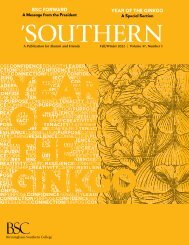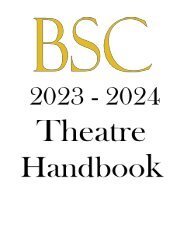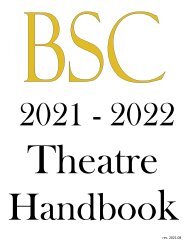- Page 2 and 3:
2 All information in this catalog p
- Page 4 and 5:
4 and Accommodation, Norton Campus
- Page 6 and 7:
6 GENERAL INFORMATION GENERAL INFOR
- Page 8 and 9:
8 GENERAL INFORMATION At Birmingham
- Page 10 and 11:
10 GENERAL INFORMATION Annapolis Gr
- Page 12 and 13:
12 GENERAL INFORMATION Professional
- Page 14 and 15:
14 ACADEMIC POLICY AND INFORMATION
- Page 16 and 17:
16 ACADEMIC POLICY AND INFORMATION
- Page 18 and 19:
18 ACADEMIC POLICY AND INFORMATION
- Page 20 and 21:
20 ACADEMIC POLICY AND INFORMATION
- Page 22 and 23:
22 ACADEMIC POLICY AND INFORMATION
- Page 24 and 25: 24 ACADEMIC POLICY AND INFORMATION
- Page 26 and 27: 26 ACADEMIC POLICY AND INFORMATION
- Page 28 and 29: 28 ACADEMIC POLICY AND INFORMATION
- Page 30 and 31: 30 ACADEMIC POLICY AND INFORMATION
- Page 32 and 33: 32 ACADEMIC POLICY AND INFORMATION
- Page 34 and 35: 34 ACADEMIC POLICY AND INFORMATION
- Page 36 and 37: 36 ACADEMIC PROGRAMS (6) Lecture an
- Page 38 and 39: 38 ACADEMIC PROGRAMS • identify s
- Page 40 and 41: 40 ACADEMIC PROGRAMS EL - Experient
- Page 42 and 43: 42 ACADEMIC PROGRAMS EXPERIENTIAL A
- Page 44 and 45: 44 ACADEMIC PROGRAMS course, projec
- Page 46 and 47: 46 ACADEMIC PROGRAMS • involve co
- Page 48 and 49: 48 ACADEMIC PROGRAMS DONALD C. HARR
- Page 50 and 51: 50 ACADEMIC PROGRAMS ACADEMIC MAJOR
- Page 52 and 53: 52 ACADEMIC PROGRAMS All revisions
- Page 54 and 55: 54 ACADEMIC PROGRAMS MAJOR, MINOR,
- Page 56 and 57: 56 ACADEMIC PROGRAMS The software e
- Page 58 and 59: 58 ACADEMIC PROGRAMS Industry Track
- Page 60 and 61: 60 ACADEMIC PROGRAMS two units from
- Page 62 and 63: 62 ACADEMIC PROGRAMS sculpture. The
- Page 64 and 65: 64 ACADEMIC PROGRAMS • interpret
- Page 66 and 67: 66 ACADEMIC PROGRAMS Biology Bachel
- Page 68 and 69: 68 ACADEMIC PROGRAMS (2) Give a fif
- Page 70 and 71: 70 ACADEMIC PROGRAMS community that
- Page 72 and 73: 72 ACADEMIC PROGRAMS BA 352 EC 350
- Page 76 and 77: 76 ACADEMIC PROGRAMS Students major
- Page 78 and 79: 78 ACADEMIC PROGRAMS certification
- Page 80 and 81: 80 ACADEMIC PROGRAMS (2) Grades of
- Page 82 and 83: 82 ACADEMIC PROGRAMS ED 320 ED 324
- Page 84 and 85: 84 ACADEMIC PROGRAMS one from the f
- Page 86 and 87: 86 ACADEMIC PROGRAMS EH 330 and EH
- Page 88 and 89: 88 ACADEMIC PROGRAMS of transnation
- Page 90 and 91: 90 ACADEMIC PROGRAMS Greek and Roma
- Page 92 and 93: 92 ACADEMIC PROGRAMS Major Requirem
- Page 94 and 95: 94 ACADEMIC PROGRAMS Major in Histo
- Page 96 and 97: 96 ACADEMIC PROGRAMS Minor Requirem
- Page 98 and 99: 98 ACADEMIC PROGRAMS Leadership Stu
- Page 100 and 101: 100 ACADEMIC PROGRAMS Upon completi
- Page 102 and 103: 102 ACADEMIC PROGRAMS Upon completi
- Page 104 and 105: 104 ACADEMIC PROGRAMS The major req
- Page 106 and 107: 106 ACADEMIC PROGRAMS Music Bachelo
- Page 108 and 109: 108 ACADEMIC PROGRAMS MU 215 MU 217
- Page 110 and 111: 110 ACADEMIC PROGRAMS the second te
- Page 112 and 113: 112 ACADEMIC PROGRAMS *While the ch
- Page 114 and 115: 114 ACADEMIC PROGRAMS MU 499 three
- Page 116 and 117: 116 ACADEMIC PROGRAMS In this proce
- Page 118 and 119: 118 ACADEMIC PROGRAMS PL 241 PL 251
- Page 120 and 121: 120 ACADEMIC PROGRAMS Courses used
- Page 122 and 123: 122 ACADEMIC PROGRAMS (3) Earn at l
- Page 124 and 125:
124 ACADEMIC PROGRAMS Majors should
- Page 126 and 127:
126 ACADEMIC PROGRAMS • integrate
- Page 128 and 129:
128 ACADEMIC PROGRAMS Spanish for t
- Page 130 and 131:
130 ACADEMIC PROGRAMS Theatre Arts
- Page 132 and 133:
132 ACADEMIC PROGRAMS two units fro
- Page 134 and 135:
134 ACADEMIC PROGRAMS Pre-Engineeri
- Page 136 and 137:
136 ACADEMIC PROGRAMS CH 225 CH 306
- Page 138 and 139:
138 ACADEMIC PROGRAMS Science degre
- Page 140 and 141:
140 ACADEMIC PROGRAMS AC 322 Interm
- Page 142 and 143:
142 ACADEMIC PROGRAMS AN 293, 393,
- Page 144 and 145:
144 ACADEMIC PROGRAMS AR 222 CE Cam
- Page 146 and 147:
146 ACADEMIC PROGRAMS AR 330 Intagl
- Page 148 and 149:
148 ACADEMIC PROGRAMS AR 499 Senior
- Page 150 and 151:
150 ACADEMIC PROGRAMS ARB 320 Advan
- Page 152 and 153:
152 ACADEMIC PROGRAMS ARH 298, 398,
- Page 154 and 155:
154 ACADEMIC PROGRAMS BA 201 The Re
- Page 156 and 157:
156 ACADEMIC PROGRAMS BA 400 Strate
- Page 158 and 159:
158 ACADEMIC PROGRAMS BI 204 QA Bio
- Page 160 and 161:
160 ACADEMIC PROGRAMS BI 402 Advanc
- Page 162 and 163:
162 ACADEMIC PROGRAMS CAC - Applied
- Page 164 and 165:
164 ACADEMIC PROGRAMS CAC 410 Syste
- Page 166 and 167:
166 ACADEMIC PROGRAMS CH 298 Teachi
- Page 168 and 169:
168 ACADEMIC PROGRAMS CHN 270 Conve
- Page 170 and 171:
170 ACADEMIC PROGRAMS EC 298, 398,
- Page 172 and 173:
172 ACADEMIC PROGRAMS education. In
- Page 174 and 175:
174 ACADEMIC PROGRAMS ED 319 ELTeac
- Page 176 and 177:
176 ACADEMIC PROGRAMS ED 472 Senior
- Page 178 and 179:
178 ACADEMIC PROGRAMS EH 208 Interm
- Page 180 and 181:
180 ACADEMIC PROGRAMS EH 240 CI Tec
- Page 182 and 183:
182 ACADEMIC PROGRAMS EH 302 Poetry
- Page 184 and 185:
184 ACADEMIC PROGRAMS EH 390 Twenti
- Page 186 and 187:
186 ACADEMIC PROGRAMS GCS 298, 398,
- Page 188 and 189:
188 ACADEMIC PROGRAMS GRS 268 GP En
- Page 190 and 191:
190 ACADEMIC PROGRAMS HB 102 Elemen
- Page 192 and 193:
192 ACADEMIC PROGRAMS HI 212 ES Ham
- Page 194 and 195:
194 ACADEMIC PROGRAMS HI 247 GP Pil
- Page 196 and 197:
196 ACADEMIC PROGRAMS women, slaver
- Page 198 and 199:
198 ACADEMIC PROGRAMS between induc
- Page 200 and 201:
200 ACADEMIC PROGRAMS HON 247 IA An
- Page 202 and 203:
202 ACADEMIC PROGRAMS films, and ca
- Page 204 and 205:
204 ACADEMIC PROGRAMS HS 242 Essent
- Page 206 and 207:
206 ACADEMIC PROGRAMS LA 102 Elemen
- Page 208 and 209:
208 ACADEMIC PROGRAMS MA 207 QA Gen
- Page 210 and 211:
210 ACADEMIC PROGRAMS MA 320 Geomet
- Page 212 and 213:
212 ACADEMIC PROGRAMS MED - Music E
- Page 214 and 215:
214 ACADEMIC PROGRAMS MFS 250 GP Hi
- Page 216 and 217:
216 ACADEMIC PROGRAMS MS - Music St
- Page 218 and 219:
218 ACADEMIC PROGRAMS MS 430 CE Org
- Page 220 and 221:
220 ACADEMIC PROGRAMS MU 151 Theory
- Page 222 and 223:
222 ACADEMIC PROGRAMS MU 298, 398,
- Page 224 and 225:
224 ACADEMIC PROGRAMS PH 121 SM Gen
- Page 226 and 227:
226 ACADEMIC PROGRAMS PH 412 Quantu
- Page 228 and 229:
228 ACADEMIC PROGRAMS PL 253 CI, IA
- Page 230 and 231:
230 ACADEMIC PROGRAMS feminist theo
- Page 232 and 233:
232 ACADEMIC PROGRAMS PS 249 CI The
- Page 234 and 235:
234 ACADEMIC PROGRAMS PS 366 Politi
- Page 236 and 237:
236 ACADEMIC PROGRAMS PY 108 ES Dev
- Page 238 and 239:
238 ACADEMIC PROGRAMS PY 298 Teachi
- Page 240 and 241:
240 ACADEMIC PROGRAMS PY 398, 498 E
- Page 242 and 243:
242 ACADEMIC PROGRAMS RE 212 IA Isl
- Page 244 and 245:
244 ACADEMIC PROGRAMS RE 255 IA Rac
- Page 246 and 247:
246 ACADEMIC PROGRAMS continue to a
- Page 248 and 249:
248 ACADEMIC PROGRAMS SBS - Social
- Page 250 and 251:
250 ACADEMIC PROGRAMS SN 391 Spanis
- Page 252 and 253:
252 ACADEMIC PROGRAMS SO 215 GP Soc
- Page 254 and 255:
254 ACADEMIC PROGRAMS THA - Theatre
- Page 256 and 257:
256 ACADEMIC PROGRAMS works within
- Page 258 and 259:
258 ACADEMIC PROGRAMS UES 260 CI EL
- Page 260 and 261:
260 ADDITIONAL ACADEMIC OPPORTUNITI
- Page 262 and 263:
262 ADDITIONAL ACADEMIC OPPORTUNITI
- Page 264 and 265:
264 ADMISSION ADMISSION Birmingham-
- Page 266 and 267:
266 ADMISSION (4) If applicable, wr
- Page 268 and 269:
268 ADMISSION A student who has wit
- Page 270 and 271:
270 FINANCES to meet their financia
- Page 272 and 273:
272 FINANCES Students who withdraw
- Page 274 and 275:
274 FINANCIAL AID Types of Financia
- Page 276 and 277:
276 FINANCIAL AID Title IV programs
- Page 278 and 279:
COLLEGE REGISTER 278 FACULTY THE CO
- Page 280 and 281:
280 COLLEGE REGISTER Centdrika Hurt
- Page 282 and 283:
282 COLLEGE REGISTER Lester Charles
- Page 284 and 285:
284 COLLEGE REGISTER William Jarvis
- Page 286 and 287:
286 COLLEGE REGISTER George F. Kler
- Page 288 and 289:
288 COLLEGE REGISTER Robert Jacob T
- Page 290 and 291:
COLLEGE REGISTER 290 BOARD OF TRUST
- Page 292 and 293:
COLLEGE REGISTER 292 Bishops Bishop
- Page 294 and 295:
294 Coursework at Other Institution
- Page 296:
296 Requirements for Graduation ...


![2023-2024 BSC Catalog Updated_UG ONLY_FINAL[82]](https://img.yumpu.com/68414854/75/500x640/2023-2024-bsc-catalog-updated-ug-only-final82.jpg)













